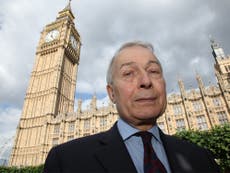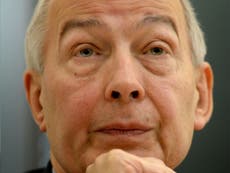If Frank Field should be deselected, why shouldn’t Jeremy Corbyn?
If the Labour church is broad enough to include Corbyn, a fellow serial disloyalist, it ought to include Field too


It was a dramatic moment in the Commons chamber. Kelly Tolhurst, a government whip in a high-visibility purple dress, was standing on the wrong side as the four tellers lined up in front of the Speaker’s chair to announce the result of the vote on 17 July.
“The ayes to the right, 301; the noes to the left, 307.” The government had unexpectedly defeated an amendment asking it to negotiate a customs union with the EU, by a majority of six.
That victory was made possible by the votes of four Labour MPs who voted with the government: Frank Field, Kate Hoey, John Mann and Graham Stringer, plus Kelvin Hopkins, who is suspended from the party pending an inquiry.
I am told that Field had bumped into Theresa May in the division lobby minutes earlier. “Thank you for voting with us, Frank,” she said.
“Oh no, prime minister, you voted with me,” he replied. It took a second for the Remain-voting prime minister to get the point.
For most of the Labour Party, Field’s decision was a great betrayal. He and his Eurosceptic colleagues were accused of “propping up” the Conservative government in a critical vote.
This is an overstatement. It would have been embarrassing for the government to lose the vote, and it would have complicated its negotiating stance in Brussels, but it would not have brought the prime minister or her government down. The 12 Tory MPs who rebelled against Theresa May on that day would support her in a confidence vote. And, as long as the DUP would refuse to do anything that might make Jeremy Corbyn, who they see as an IRA supporter, prime minister, she is safe.
All the same, Field’s local Labour party in Birkenhead took a dim view, passing a motion of no confidence in him. And when Field this week announced that he was resigning the whip to sit as an Independent Labour MP, there were many in the party ready to say good riddance and that he had forfeited his right to represent them.
A spokesperson for Corbyn, speaking to journalists and asking to be identified only as “a source”, as these proponents of no-spin, honest politics do, said that Field’s departure was no surprise as he was going to be deselected by his local party anyway and that he had jumped before he was pushed.
Which is fine. It is their party now, and they are entitled to run it their way. But let us recall, for example, another cliff-edge vote in the House of Commons. On 27 January 2004 the government won by just five votes to pass the tuition fees bill. Corbyn was one of 72 Labour MPs on that occasion voting with the Conservatives against the bill.
Oh, but that’s different, say his supporters. He was right. Leave aside that student loans payable after graduation allowed hundreds of thousands of young people to go to university who would otherwise have been the denied the chance, Corbyn did his best to undermine Labour leaders, voting with the Tories hundreds of times.
When Stephen Pollard, who once applied to work for Field, pointed this out this week, John Danton replied: “But Corbyn did not vote with the Conservatives, he voted with his conscience.”
You can imagine Michael Howard, the Tory leader, thanking Corbyn for voting with him, and Corbyn replying: “Oh no, I’m voting with my conscience.”
What is striking about Field and Corbyn is their similarities rather than their differences. Admittedly, Field nominated Corbyn for the leadership only in the hope that he would be crushed. But, like Corbyn, Field is a serial disloyalist. In 2014, when talk of moves to replace Ed Miliband as leader were rife, the Labour leader asked to see him. Miliband said: “Are you loyal?”
To which Field says he replied: “Yes, I am. Now.”
When Miliband asked what he meant by “now”, Field told him: “I have been trying to persuade Alan Johnson that he should replace you, but he won’t.”
But if the Labour church is broad enough to include Corbyn, it ought to include Field too. And, until Field was prompted by the comments of Jonathan Sacks, the former chief rabbi, about Labour antisemitism, that seemed to be Corbyn’s attitude. While his hotheaded supporters might want to purge the party of Blairites, and even welcome the row about antisemitism as a chance to do so, Corbyn’s close advisers recognise that a running series of deselection battles around the country would do Labour’s image nothing but harm. Some of them are even as old as I am, and remember the same “will they, won’t they” about Labour MPs defecting to the SDP in 1982, which had such a disastrous effect on Labour’s image.
All is fair in Labour civil wars, so it is hopeless to point out that the Blairites were indulgent of Corbyn’s long history of disloyalty. But the Corbynites ought at least to recognise that there is what their leader might call an English irony in their attempts to push Frank Field out of the party.



Join our commenting forum
Join thought-provoking conversations, follow other Independent readers and see their replies